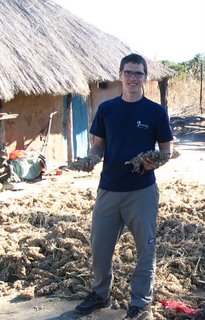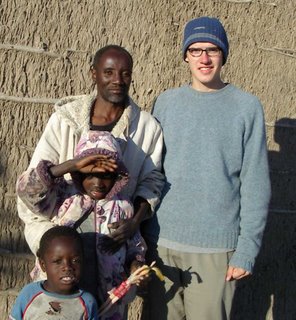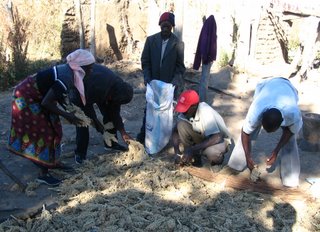The big challenges of Small Scale farming.
For the last month I’ve been working in Southern Zambia with Engineers Without Borders on a project to promote Sorghum growing. The concept of the project in incredibly simple; Sorghum is more drought resistant than corn, but not commonly grown due to government legislation that attempted to attain food security by consolidating crop production. Through my last month here I’ve realized the potential of this project to improve the livelihoods of small scale farmers, as well as the many barriers preventing this.
As part of the project we have introduced a Sorghum growing competition in efforts to encourage good farming practices and knowledge sharing among participants. I recently spent a day helping to judge some of the fields and I was struck by the number of challenges these farmers face, and the stark contrasts with those faced in Canada.
As we started judging it was great to see the farmers enthusiasm, their only complaint was that it took us too long to get to their fields. We are generally late arriving to the fields due to various unpredictable delays such as fuel shortages, police checkpoints, or like today waiting for elephants to cross the highway.
The main criterion for the competition is to judge the farmers expected yield. Our first field of the day belonged to Mr. Godfrey Malilu, we were surprised to see how tall his plants were. When we asked why he informed us, “we were not given the right seeds, they produced the wrong variety plant.” Unfortunately Godfrey was supplied seeds that although certified in Zambia, contained a mixture of varieties, none of which are desirable in Southern Zambia. While other farmers were harvesting, Godfrey’s plants just kept getting taller and taller without producing grains. Unfortunately for a small scale farmer the options for recourse are limited and he will just have to try again next year.
As we moved on to the next field belonging to Mr. Max Lubinda we noticed an elaborate contraption of sticks holding pop-cans on strings. As we asked for a demonstration one of the children ran onto a nearby platform and began vigorously pulling on the string. All through the field we could hear the clanging of pop cans intricately connected to the string the child was pulling. In the distance we could see a flock of small birds heading into the bush. One of the main differences in cultivating Corn and Sorghum is that the Sorghum grains are exposed and vulnerable to birds. During this display I was reminded of the countless mornings in Niagara where I had awoken early to the sound of electronic hooting, or bird bangers. The low-tech Zambian equivalent is entertaining to watch, but requires people to spend their entire day in the field.
Our next contestant was Miss Gertrude Mwinga. This turned out to be a quick visit as most of Gertrude’s crop had been eaten by bollworms, leaving us with nothing to judge. Gertrude informed us “I planted too late, and couldn’t stop the bugs”. In the course of one year, the Sikaunzwe area has lost 80% of its cattle to an airborne illness. This has left many without animals to pull their plows. As a result many people planted late making them more susceptible to insects and birds. In Canada this would not have been a problem, a small application of pesticide would save the harvest. Gertrude could not afford the pesticide and since there is nowhere she can turn for a loan, she can only watch as the bollworms eat her Sorghum.
The least expected challenge we noticed during our day of judging was the damage caused by a frost which settled about a week earlier. This was another reminder of the vulnerability of these farmers and of my failure to pack warm enough clothes for the Zambian winter.
During the judging we also came to realize that none of these farmers use irrigation. Most of them were within only a few kilometers from one of Africa’s largest rivers; the Zambezi, but none could afford to irrigate. In Zambia that privilege is reserved only for the white commercial farmers who have enough money for the initial investment.
Through my month here I have been shocked and impressed by Zambians on many occasions. The people here can endure through what seem to be impossible circumstances. I’ll never forget seeing a woman breast feed and load rocks onto a truck at the same time. Or attending numerous church services where the people would worship with more joy and enthusiasm than I’ve ever experienced, regardless of the walls being broken by the rains, or the building not yet existing.
Despite the numerous complications many farmers have managed to produce great Sorghum crops, bringing them closer to food security and increasing their income by supplying the grains to be used in one of Zambia’s most popular beers. So far our project is being called a success, which is very rare in development work. Part of the success is based on the poor yield of corn this year which was flooded from the heavy rains. Fortunately, to our surprise Sorghum is good in flooding as well as drought.
On July 14th we will get to celebrate at the first ever Sorghum festival, where the Zambian minister of Agriculture will announce the winners of the growing contest. We’ll also get to enjoy watching the 10 most innovative bird scaring techniques. We’re just keeping our fingers crossed that all 700 participants can show up, and that the minister is not slowed down by any fuel shortages or elephant crossings.




As part of the project we have introduced a Sorghum growing competition in efforts to encourage good farming practices and knowledge sharing among participants. I recently spent a day helping to judge some of the fields and I was struck by the number of challenges these farmers face, and the stark contrasts with those faced in Canada.
As we started judging it was great to see the farmers enthusiasm, their only complaint was that it took us too long to get to their fields. We are generally late arriving to the fields due to various unpredictable delays such as fuel shortages, police checkpoints, or like today waiting for elephants to cross the highway.
The main criterion for the competition is to judge the farmers expected yield. Our first field of the day belonged to Mr. Godfrey Malilu, we were surprised to see how tall his plants were. When we asked why he informed us, “we were not given the right seeds, they produced the wrong variety plant.” Unfortunately Godfrey was supplied seeds that although certified in Zambia, contained a mixture of varieties, none of which are desirable in Southern Zambia. While other farmers were harvesting, Godfrey’s plants just kept getting taller and taller without producing grains. Unfortunately for a small scale farmer the options for recourse are limited and he will just have to try again next year.
As we moved on to the next field belonging to Mr. Max Lubinda we noticed an elaborate contraption of sticks holding pop-cans on strings. As we asked for a demonstration one of the children ran onto a nearby platform and began vigorously pulling on the string. All through the field we could hear the clanging of pop cans intricately connected to the string the child was pulling. In the distance we could see a flock of small birds heading into the bush. One of the main differences in cultivating Corn and Sorghum is that the Sorghum grains are exposed and vulnerable to birds. During this display I was reminded of the countless mornings in Niagara where I had awoken early to the sound of electronic hooting, or bird bangers. The low-tech Zambian equivalent is entertaining to watch, but requires people to spend their entire day in the field.
Our next contestant was Miss Gertrude Mwinga. This turned out to be a quick visit as most of Gertrude’s crop had been eaten by bollworms, leaving us with nothing to judge. Gertrude informed us “I planted too late, and couldn’t stop the bugs”. In the course of one year, the Sikaunzwe area has lost 80% of its cattle to an airborne illness. This has left many without animals to pull their plows. As a result many people planted late making them more susceptible to insects and birds. In Canada this would not have been a problem, a small application of pesticide would save the harvest. Gertrude could not afford the pesticide and since there is nowhere she can turn for a loan, she can only watch as the bollworms eat her Sorghum.
The least expected challenge we noticed during our day of judging was the damage caused by a frost which settled about a week earlier. This was another reminder of the vulnerability of these farmers and of my failure to pack warm enough clothes for the Zambian winter.
During the judging we also came to realize that none of these farmers use irrigation. Most of them were within only a few kilometers from one of Africa’s largest rivers; the Zambezi, but none could afford to irrigate. In Zambia that privilege is reserved only for the white commercial farmers who have enough money for the initial investment.
Through my month here I have been shocked and impressed by Zambians on many occasions. The people here can endure through what seem to be impossible circumstances. I’ll never forget seeing a woman breast feed and load rocks onto a truck at the same time. Or attending numerous church services where the people would worship with more joy and enthusiasm than I’ve ever experienced, regardless of the walls being broken by the rains, or the building not yet existing.
Despite the numerous complications many farmers have managed to produce great Sorghum crops, bringing them closer to food security and increasing their income by supplying the grains to be used in one of Zambia’s most popular beers. So far our project is being called a success, which is very rare in development work. Part of the success is based on the poor yield of corn this year which was flooded from the heavy rains. Fortunately, to our surprise Sorghum is good in flooding as well as drought.
On July 14th we will get to celebrate at the first ever Sorghum festival, where the Zambian minister of Agriculture will announce the winners of the growing contest. We’ll also get to enjoy watching the 10 most innovative bird scaring techniques. We’re just keeping our fingers crossed that all 700 participants can show up, and that the minister is not slowed down by any fuel shortages or elephant crossings.





2 Comments:
This is a dumb question, but... why don't people here donate pesticides?
Not a dumb question at all, probably the most important question in development. People in Canada probably do donate pesticides along with lots of other great things. There is usually a problem with things getting to where they need to. This answer could go on for pages as to why things don't get to where they need to. But a quick example I was walking to work this morning with Bruceston who works with the World Food Program, and he was telling me that the food that was donated for last years drought is just arriving now, which really sucks because we don't need it now, we've just had a great harvest. So now they are forced to distribute this food at the wrong time and it will destroy the market because no one is going to buy Maize when is it coming for free.
CARE has one neat program where they try to simplify the process by just donating some money to the people who need it, then they can buy food if they need to or beer if they want to. Even when the food is donated people say that the real distribution happens after the truck leaves, people start trading and selling the food so they can get what they actually want.
Another comment on this, personally I would not want people to donate pesticides from Canada because people here would start to rely on that and when the donations end after a crisis, people would not be able to afford it. Often when you start using inputs like pesticides and fertilizers you can't go back to organic because you destroy the soil.
Again no quick answer...
Post a Comment
<< Home